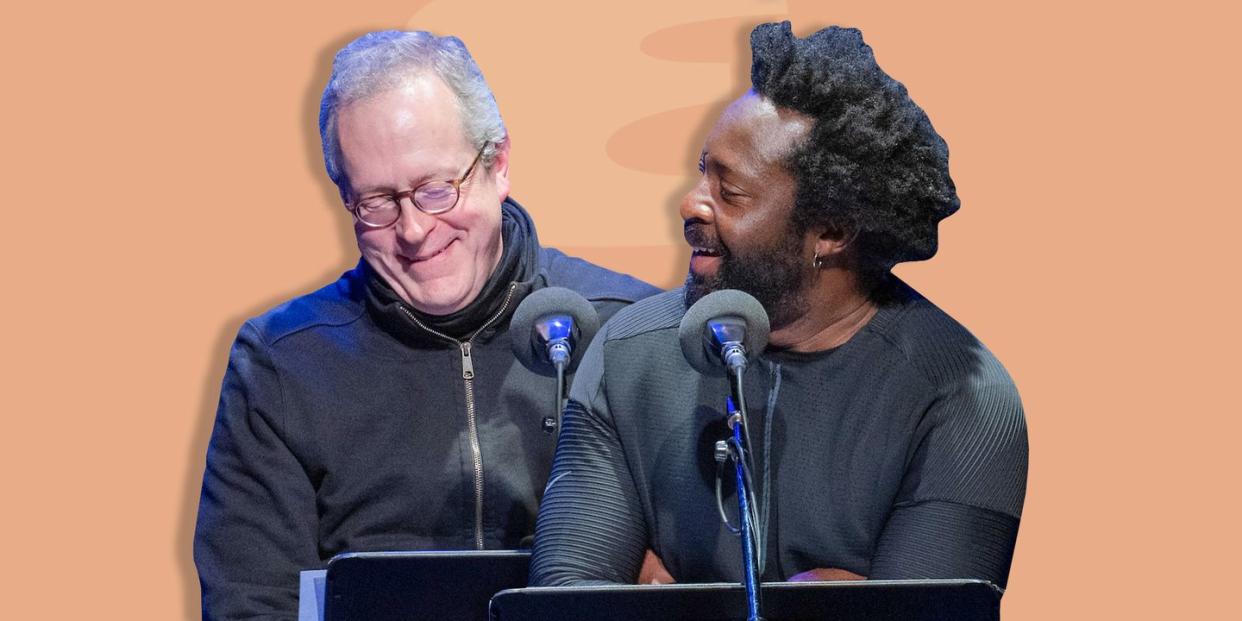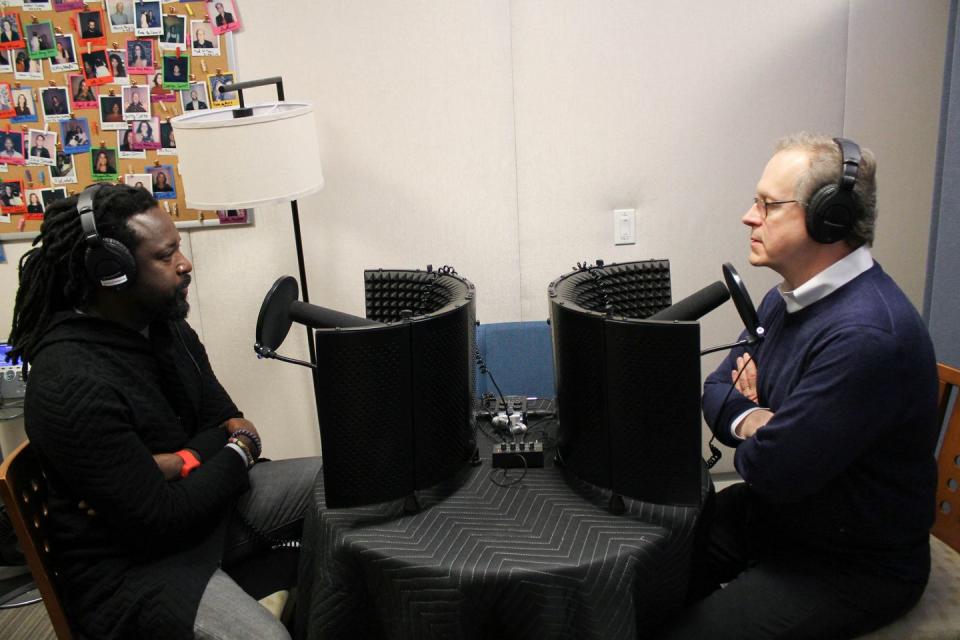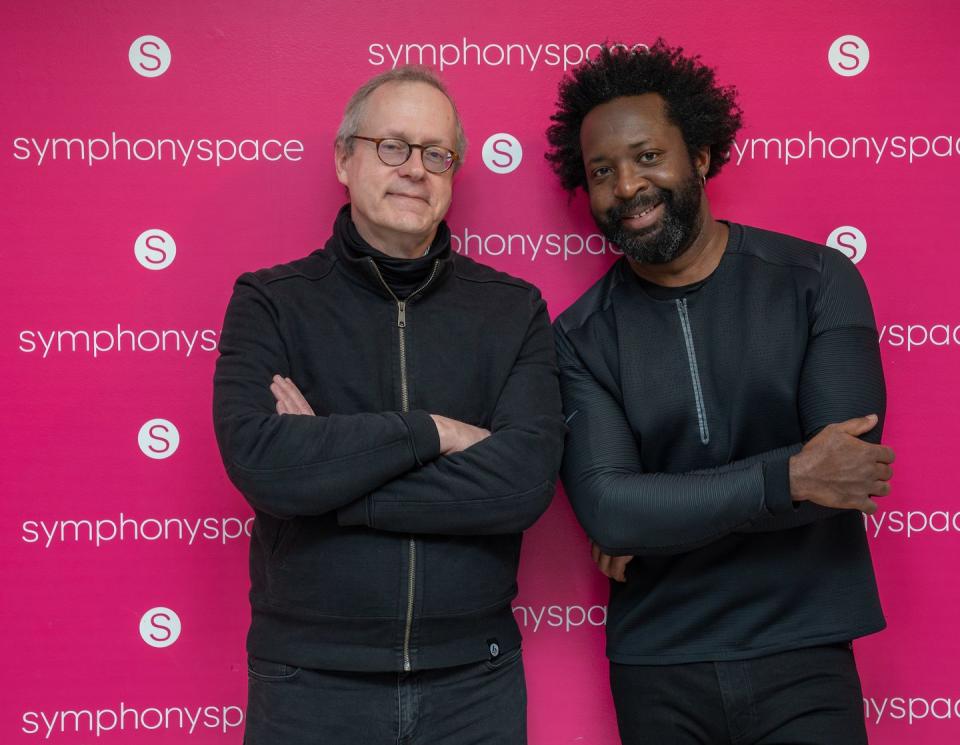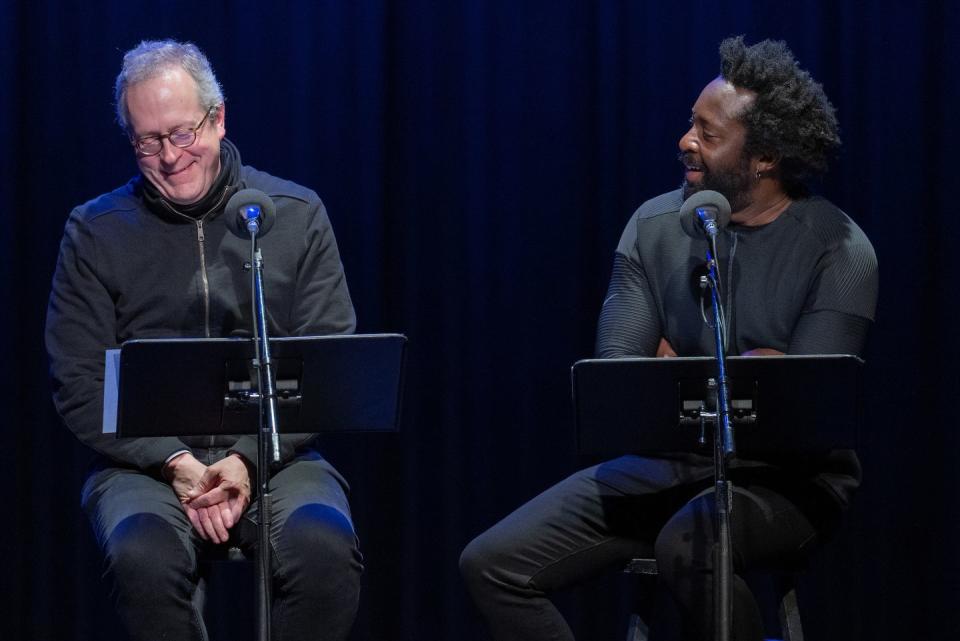The Case For Trash-Talking Dead Authors

- Oops!Something went wrong.Please try again later.
- Oops!Something went wrong.Please try again later.
- Oops!Something went wrong.Please try again later.
"Hearst Magazines and Yahoo may earn commission or revenue on some items through these links."
For bestselling novelist Marlon James and his longtime editor Jake Morrissey, fighting for books is all in a day’s work. But fighting over books? That’s just good, old-fashioned fun.
It’s also the beating heart of their podcast, Marlon and Jake Read Dead People, now entering its much-anticipated third season. Conventional wisdom encourages that we never speak ill of the dead, but on Marlon and Jake Read Dead People, speaking ill of the dead is the main event. In each episode, author and editor banter about the late literary greats who inspire, torment, and obsess them. As James and Morrissey often joke, dead authors can’t clap back on Twitter—which perhaps explains the rollicking, no-holds-barred tone of their conversations, where disagreements and debates abound. Safe from the wrath of dead writers, both podcasters clearly feel unafraid to share literary hot takes that might be considered unpopular. In just this thirty-minute conversation with Esquire, James and Morrissey managed to lambaste literary giants like Ian Fleming, William Faulkner, Virginia Woolf, and Eudora Welty, among others. “Saying ‘my favorite Faulkner’ is like saying ‘my favorite disease,’” Morrissey joked.
But even when James and Morrissey are dishing about books and authors they hate, it all comes from a place of immense love for and faith in literature. Amid an unprecedented surge in book bannings across the United States, they take their role as advocates for reading quite seriously. “The enemy has never been people who read a book and hate it,” James tells Esquire. “It’s often people who don’t read books at all.”
James and Morrissey Zoomed with Esquire to preview Season Three, which promises to tackle a variety pack of literary topics, from poetry to campus novels to “judging a book by its cover.” This interview has been edited for length and clarity.
ESQUIRE: What can you preview about Season Three? What new territory did you explore that you haven't in previous seasons?
MARLON JAMES: One of the things we haven’t done a lot of is introduce each other to books that the other hasn’t read. In the new season, we talked a lot more about that. We’re not trying to turn it into a book club, but we’re kind of turning it into a book club. I’m very curious about books that have stood the test of time, and books that really haven’t aged well.
JAKE MORRISSEY: For Marlon and I, our interests overlap, but they also diverge. There was one particular book I asked Marlon to read—it was James Thurber’s autobiography, which I thought was kind of awful. Marlon liked it in ways that I didn’t expect him to. In other words, I was as delighted by his surprise as I was surprised at my lack of enthusiasm for the book. Having these conversations about anything from books to movies or television, it's just another conversation about stuff that interests us.
MJ: There's something in the overall argument, which is: are books timeless? We’re literally reading books by dead people, some of them hundreds of years old. Some, like Frankenstein, you realize, “This aged really well.” Some, like Casino Royale, you realize, “Not so much!”
JM: One of the things we haven’t talked, and maybe we should in later episodes, is the whole idea of changing Roald Dahl or Ian Fleming to edit their work for a new sensibility. What do you think? What does it mean? What do you like? What don’t you like? Those are legitimate questions that you, as somebody who’s interested in books, can certainly ask and have an opinion about.
MJ: We’ve managed to skirt against the culture wars for a few seasons now. I have a feeling we can no longer escape it.

Season Four has to go there, right?
MJ: What do you do with Roald Dahl? What do you do with so-called problematic authors who weren’t problematic before? Chrissy Teigen isn’t dead, so we can’t talk about her, but think about it: a social media post she made barely ten years ago is toxic now. What does it mean when you go back and read Uncle Tom’s Cabin?
JM: Or Agatha Christie. Or: is Chitty Chitty Bang Bang the only Ian Fleming novel that won’t be gotten rid of? I don’t know. The idea of how we approach books is shifting. We’re constantly having these conversations where we’re asking, “Should we teach Tom Sawyer in school anymore?”
MJ: How much can these books still reflect what we’re living, where we’re living, and what we’re concerned about? It’s important to read these books not necessarily as historical documents, but to read them as what they are: fiction of their times. We can read them as contemporary readers and see what it is they’re saying about those times. If you read Jane Austen as a contemporary reader, you realize there’s so much irony in her work. In a way, we’re trying to make these books contemporary in the sense that we should still fight for them and fight over them.
JM: Also, it’s okay if Marlon likes Sense and Sensibility and think the ending is wrong. Or I like Persuasion, and he’ll say, “Okay, explain to me why you like it.” In other words, this becomes a conversation about stuff we believe based on what we’ve read, even if the book might be 200 years old.
Have you ever been able to successfully change one another’s minds about a book or an author?
JM: I still don’t like Great Expectations, but I understand why you do, Marlon. Even though I love Dickens, I’m not sold, but I understand the reasons why you like it so much.
MJ: Thanks to you, I’m really starting to consider that Tom Sawyer is better than Huckleberry Finn. This statement alone is going to cause a flame war on Esquire’s website.
JM: Thank you. I feel seen.

I had the chance to preview a few episodes from Season Three. In one upcoming episode, you discuss books set in school and university settings. You ask one another, “What was the literature class that turned you off of books?” It’s certainly true that plenty of young people who love to read become disenchanted because of their schooling. Where are we going wrong in how we teach these books by dead authors? What should we be doing differently?
MJ: Having been a teacher and a student both, I only once or twice came across a teacher who taught me how to love books. They taught me how to break them down, how to close read, how to look for themes—all of that is important. But they didn’t start out by telling me why I should love this book. I remember one of my teachers at sixth form came into class and said, “Man, I’m so depressed, because you guys get to read Pride and Prejudice for the first time. I’ll never get to have that experience again.” So of course, we were all thinking, “We came here to read D.H. Lawrence, but what’s this Pride and Prejudice business?” It’s still one of my absolute favorite novels of all time. The first thing that teacher did was get us to love the book. If you love the book, then you’ll be interested in getting to know it better. It’s important to remember and easy to forget that novels are fun, and lit class is supposed to be a fun time.
JM: One of the things that I talk about a lot is being surprised by books. As a kid, the books that I liked in school were the ones that surprised me. I actually think we make a mistake as educators to say, “Boys don’t like to read, so we’re only going to read books that have boys as the main characters.” As a reader, that didn’t surprise me. But other books, with women as the main characters or crazy adventures… those surprised me and engaged me as a reader. I would advocate for more surprise being taught in schools, whether it’s a short story with a surprise ending or a novel with characters you didn’t expect to encounter.
I wonder if this leads us to reading less “great literature” and more fun, contemporary material. Marlon, at one point in Season Three, you say, “I have the sense that I'm not reading great literature if I'm not reading these books.” And Jake, you respond, “But you don't have to read great literature every moment of your waking life.” Tell me about freeing yourselves up to read books that aren’t “great literature,” and why more readers should do the same.
MJ: The whole idea of ranking books gets dangerous. When we start to rank books with this sort of snobbery, we miss out, because if you’re the person who says, “I don’t read genre fiction, but I read Hemingway,” then you’re not reading Hemingway, right? It’s a poor experience of literature, when you start to rank books. I’m not saying “every book for every occasion,” but you should read as widely as you possibly can. There’s always something to learn from a novel; some of my best lessons came from X-Men comics. These distinctions only hurt you, as a reader. I know people who’ve read literature their entire lives, and they haven’t enjoyed a book in years. There are also people who don’t realize that a book like Dostoyevsky’s The Idiot is actually fun. A lot of these books they’ve been taught to stay away from or run toward are books that are broad and open. You can learn things, you can enjoy them, you can cry over them. It’s still ultimately a way of living more than one life. It’s fine to live life as a doomed Russian heiress, but don’t you also want to be a detective? Or maybe a spy?
JM: I’ve never wanted to be a doomed Russian heiress. Here's what I'll say: having a varied palate is like having a varied diet. You’re not going to live on lettuce and capers alone. I realized recently that I have a limited number of books to read left in my life, and I want to be able to choose them intentionally as much as possible. I’m giving myself permission to put down the book if I’m not interested in it. Because of Marlon, I’m reading a lot more fantasy. I re-read the Gormenghast Trilogy; as Marlon knows, I think it’s 250 pages too long, but it's worth reading, because it’s a lot of things at the same time. You can read Ian Fleming; you can read the X-Men comics; you can read other stuff. It can be great and enjoyable and you can get a lot out of it. It doesn’t all have to be Silas Marner, unless you want it to be Silas Marner.
And these distinctions are so arbitrary, so commercial, so academic. You might meet someone who says, “I don't read science fiction,” but they read Frankenstein. They’re reading science fiction anyway.
MJ: People are creating these boundaries in order to rank books and create exclusivity and snobbery about books. There’s no person sadder than a lit snob, because it means you’re the one ignoramus who doesn’t know you’re ignorant. It’s a pretty limited cultural vocabulary. It’s no different from the person who’s too good for pop culture. I know I couldn’t be the writer I am if I didn’t read widely.
JM: I happily read British murder mysteries from the Golden Age, with all of their anti-Semitism, because I’m interested in how they put together a plot. I’m interested in how story comes together, so reading these books is a way for me to understand mechanics in a way that I wouldn't have if I only read Updike and Cheever.
MJ: Also, you can read a book critically and still get to the end of it. I’ve been going through this James Bond phase, and it’s interesting how nearly every villain is mixed race. It doesn’t put me off from reading, but it’s something that I’ve noticed as a reader in 2023. It’s something worth talking about, but it’s certainly not a reason to not read.
As someone who also finds Flannery O'Connor terribly overrated, I was delighted to hear you discuss her in the new season. During that conversation, one of you asked, “Am I the problem or is she the problem?” Are there any writers or books you’ve encountered in this podcasting journey where you've determined that you, indeed, are the problem?
MJ: I know some living writers where I’ve been the problem.
JM: That’s a different podcast.
MJ: Some writers have written both readable and unreadable books. For example, I realize that maybe the problem with Absalom, Absalom! is me. People say it’s the greatest Faulkner, but I find it impenetrable and unreadable.
JM: I actually think it’s Faulkner. Saying “my favorite Faulkner” is like saying “my favorite disease.” Maybe it’s because I grew up in New England that I have a blind spot when it comes to Southern fiction. I don't get A Confederacy of Dunces. Never have, never will. I don’t get Eudora Welty. That might be me—she’s a fine writer, but for me, she’s a waste of newsprint. It’s me with Virginia Woolf, too. I don’t get Virginia Woolf.
MJ: Whereas I do.
JM: Do you think that’s because of your education? You came from that English public school sensibility.
MJ: Some of it could be that. We were so drummed in with a Victorian sensibility that the stream-of-consciousness thing just felt like a breath of fresh air, even though none of us understood it. We just knew it wasn’t Middlemarch.
JM: Meanwhile, I’m like, “Could she use a period, please? Could she turn the page? Let’s move on.” I don’t discount her skill, and the message, and the ideas she wants to impart, but her books just aren’t for me. I’m going to get some hate for that, aren’t I?

Looking back at previous seasons, I came across an interview you did back when Season Two launched. Marlon, you said at the time, “Talking about literature is a way to remind people that literature is something you can participate in. Don't keep people out. Nobody's coming for your books.” Reading that in 2023, in this moment where there's a growing movement to ban books, the idea that nobody is coming for your books sat differently with me. Did it sit differently with you as you made this new season?
MJ: It’s on my mind in general. I’ve actually given a few speeches about banned books that changed my life. It turns out that some people are coming for your books: people who don’t read. The enemy has never been people who read a book and hate it. It’s often people who don’t read books at all. They used to go after dead authors because dead authors couldn’t fight back, but now they’re going after living authors quite a bit—of course, those authors are mostly Black, mostly queer, and mostly both. A podcast like ours can talk about the type of books that have always been challenged, but also the type of books that told us that we were going to get here. Fahrenheit 451 predicted this.
JM: The idea that I’m banned from reading a book makes me want to read the book more. Anything that we can do as two guys with a podcast about books that mean something to us, that we liked or didn't like… I hope we can extend the dialogue about not being afraid to open a book and be transported in a way that you never expected. These books get you to think about the world in a different way.
How has doing this podcast together changed or enriched your work together when you go back to working on a novel?
JM: I actually noticed in the last novel we worked on together, Moon Witch, Spider King, that I had a lot fewer questions in that book than I did in Marlon’s previous book. If nothing else, I understand where he comes from better.
MJ: I’m just going to say ditto. As long as he doesn’t cut out 200 pages of my book.
You Might Also Like

